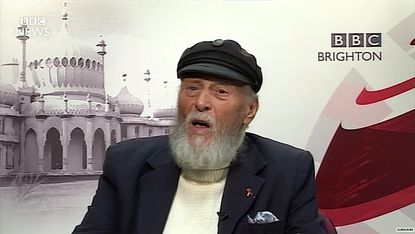Britain to posthumously pardon thousands of gay men, spurred by Alan Turing


On Thursday, Britain's Conservative government said that it will posthumously pardon thousands of men convicted of crimes relating to homosexuality, like buggery, gross indecency, and loitering with intent, often in men's restrooms. Homosexuality was decriminalized in the U.K. in stages between 1967 and 1982, and same-sex marriage was legalized in 2014. John Sharkey, the member of the House of Lords who proposed the forthcoming law, also pushed through a 2009 formal government apology to Alan Turing, the mathematician and World War II codebreaker who was convicted on homosexuality charges in 1952 and committed suicide two years later. Queen Elizabeth II pardoned Turing in 2013, and the new law will be named after him.
Sharkey estimates that some 65,000 men were convicted under the anti-homosexuality laws — lesbian activity was never specifically made illegal in Britain — and 15,000 are still alive. Not all deceased gay men would be eligible for pardon — certain acts, like sexual activity in a public lavatory, are still illegal. Irish playwright Oscar Wilde may or may not be eligible under the new law, because of the particulars of his case, The New York Times notes.
Not all gay rights proponents are satisfied with the new law, including the advocacy group Stonewall, which says it should also automatically pardon living men — they can seek a case-by-case pardon under at 2012 law — and activist George Montague, 93, who was convicted in the 1970s of gross indecency. Watch Montague explain to the BBC below what life was like for gay men in the bad old days, why they congregated in restrooms, and why he wants an apology and would not accept a pardon. Peter Weber
Subscribe to The Week
Escape your echo chamber. Get the facts behind the news, plus analysis from multiple perspectives.

Sign up for The Week's Free Newsletters
From our morning news briefing to a weekly Good News Newsletter, get the best of The Week delivered directly to your inbox.
From our morning news briefing to a weekly Good News Newsletter, get the best of The Week delivered directly to your inbox.
Create an account with the same email registered to your subscription to unlock access.
Sign up for Today's Best Articles in your inbox
A free daily email with the biggest news stories of the day – and the best features from TheWeek.com
Peter has worked as a news and culture writer and editor at The Week since the site's launch in 2008. He covers politics, world affairs, religion and cultural currents. His journalism career began as a copy editor at a financial newswire and has included editorial positions at The New York Times Magazine, Facts on File, and Oregon State University.
-
 'A direct, protracted war with Israel is not something Iran is equipped to fight'
'A direct, protracted war with Israel is not something Iran is equipped to fight'Instant Opinion Opinion, comment and editorials of the day
By Harold Maass, The Week US Published
-
 Today's political cartoons - April 17, 2024
Today's political cartoons - April 17, 2024Cartoons Wednesday's cartoons - political anxiety, jury sorting hat, and more
By The Week US Published
-
 Arid Gulf states hit with year's worth of rain
Arid Gulf states hit with year's worth of rainSpeed Read The historic flooding in Dubai is tied to climate change
By Peter Weber, The Week US Published
-
 Puffed rice and yoga: inside the collapsed tunnel where Indian workers await rescue
Puffed rice and yoga: inside the collapsed tunnel where Indian workers await rescueSpeed Read Workers trapped in collapsed tunnel are suffering from dysentery and anxiety over their rescue
By Sorcha Bradley, The Week UK Published
-
 More than 2,000 dead following massive earthquake in Morocco
More than 2,000 dead following massive earthquake in MoroccoSpeed Read
By Justin Klawans Published
-
 Mexico's next president will almost certainly be its 1st female president
Mexico's next president will almost certainly be its 1st female presidentSpeed Read
By Peter Weber Published
-
 North Korea's Kim to visit Putin in eastern Russia to discuss arms sales for Ukraine war, U.S. says
North Korea's Kim to visit Putin in eastern Russia to discuss arms sales for Ukraine war, U.S. saysSpeed Read
By Peter Weber Published
-
 Gabon's military leader sworn in following coup in latest African uprising
Gabon's military leader sworn in following coup in latest African uprisingSpeed Read
By Justin Klawans Published
-
 Nobody seems surprised Wagner's Prigozhin died under suspicious circumstances
Nobody seems surprised Wagner's Prigozhin died under suspicious circumstancesSpeed Read
By Peter Weber Published
-
 Western mountain climbers allegedly left Pakistani porter to die on K2
Western mountain climbers allegedly left Pakistani porter to die on K2Speed Read
By Justin Klawans Published
-
 'Circular saw blades' divide controversial Rio Grande buoys installed by Texas governor
'Circular saw blades' divide controversial Rio Grande buoys installed by Texas governorSpeed Read
By Peter Weber Published